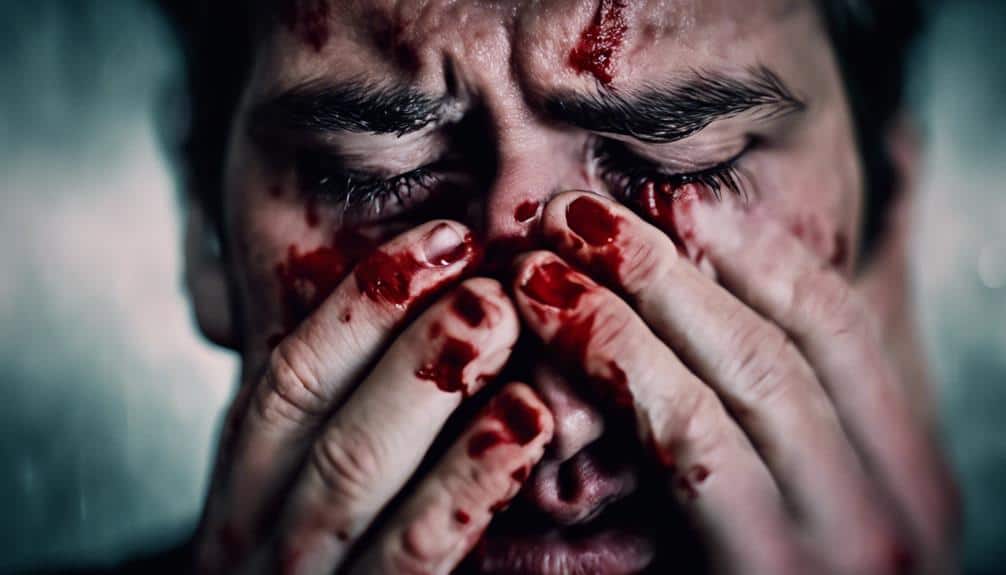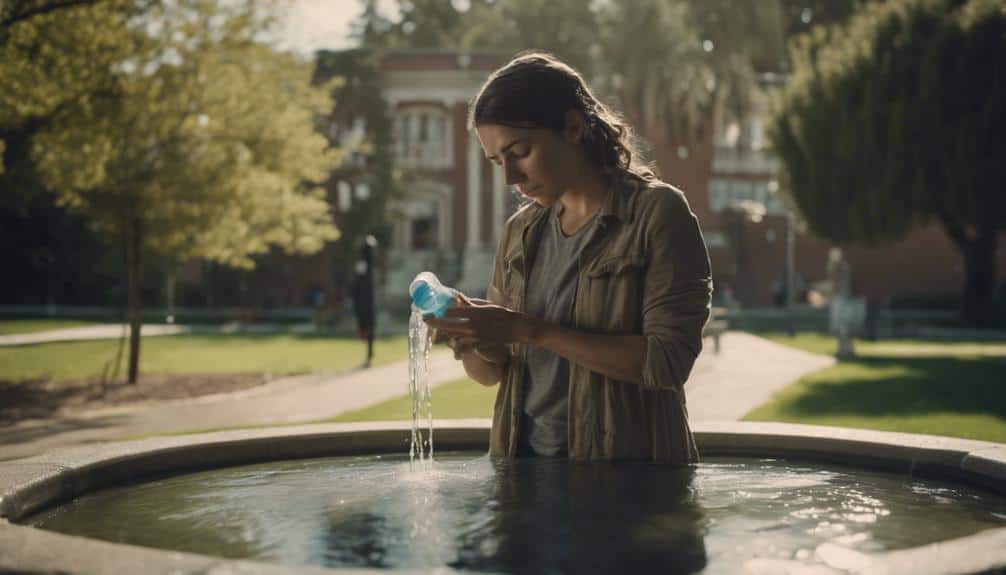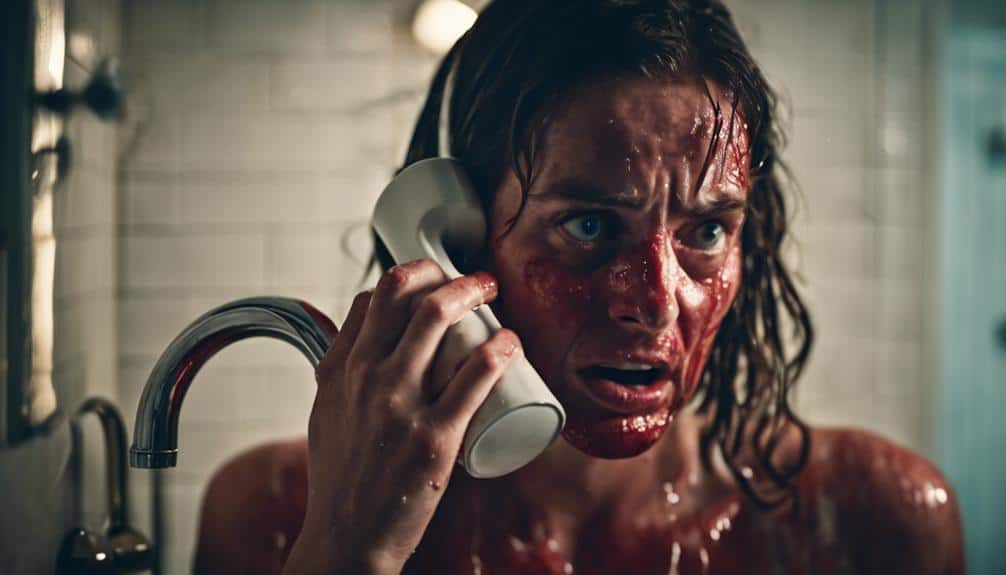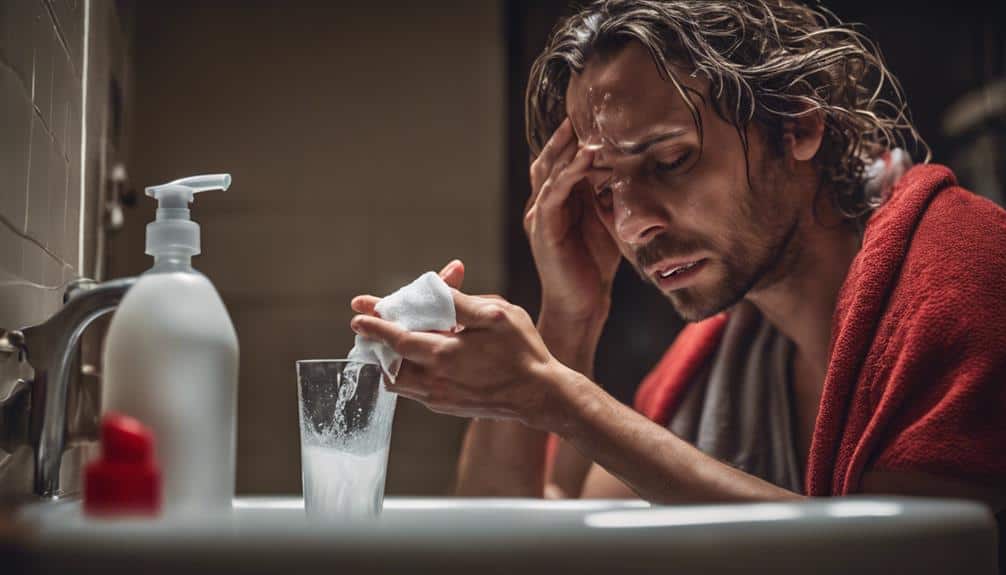So, you’ve just been
pepper sprayed, and it feels like a thousand fiery needles have just attacked your face. First, get to
fresh air fast to help your breathing. Then,
rinse your eyes with water or saline for at least 15 minutes, blinking a lot to get out the pesky particles. Ditch any contaminated clothes, and for heaven’s sake, don’t touch your eyes! Clean your skin with soap and water, but keep it gentle. If you still feel like you’ve hugged a cactus after 45 minutes,
seek medical help. Get ready to discover more vital tips that could save your day.
Understand the Effects
Why is it essential to understand the effects of
pepper spray? Well, when you experience
pepper spray exposure, it’s no joke. The
active ingredient in pepper spray, capsaicin, is a real beast, causing
intense irritation to your eyes, skin, and respiratory system. Imagine the discomfort of tear gas but with a
burning sensation that feels like your face is on fire. Your skin will sting, your eyes will involuntarily close, and you might struggle with breathing. The
burning targets eyes, nose, and throat,
incapacitating attackers and providing critical escape time.
The pain, described as overwhelming by many, can make you feel like you’re in a scene from a horror movie. It’s not just a little tickle; the pain can be severe, especially if you have asthma or other respiratory issues. The symptoms can last from 30 minutes to two hours, with your throat itching and your skin turning red.
You might think splashing some water will help, but washing off that oily substance isn’t easy. Capsaicin sticks around, causing
lingering pain.
Severe injuries aren’t common, but if you’re suffering beyond 45 minutes, it’s time to
see a doctor. Knowing these effects can save you from a world of hurt.
Immediate Actions to Take
If you get pepper sprayed, the first thing you should do is get to
fresh air—don’t wait! This will help with your breathing and start to clear out the nasty stuff. Next,
flush your eyes with water or saline for at least 15 minutes; trust me, your eyes will thank you.
Flush Eyes Thoroughly
One of the first and most important steps to take if you get pepper sprayed is to flush your eyes thoroughly. This helps remove the irritant and alleviate the burning sensation. Here’s what you should do:
- Remove contact lenses: If you wear contacts, take them out immediately. Leaving them in can trap the pepper spray, causing more irritation and discomfort.
- Flush with clean water or saline solution: Use either clean water or a saline solution to rinse your eyes for at least 15 minutes. Make sure the water flows from the inner corner to the outer corner of your eyes. This prevents recontamination and guarantees you’re washing out the irritant effectively.
- Encourage blinking: While you’re flushing your eyes, keep blinking. Blinking helps dislodge any remaining particles from your eyes, making the process more effective.
It’s essential to avoid using soap or other solutions in your eyes, as they can worsen irritation and cause more discomfort. If your symptoms persist for more than 45 minutes after you’ve flushed your eyes, seek medical attention. This step is critical to prevent any potential long-term damage to your eyes.
Seek Fresh Air
After getting pepper sprayed, the first and most essential step is to move to an area with
fresh air. Trust me, you’ll want to get away from that cloud of misery as soon as possible. Fresh air is your best friend right now. It helps alleviate those nasty
respiratory symptoms like
coughing and
throat irritation almost instantly. Plus, it reduces your overall exposure to pepper spray, which is definitely a good thing. If possible, try to find a
safe distance of 6-8 feet away from the source of the spray to further minimize contact.
Now, don’t head indoors. Pepper spray is aerosolized, meaning those tiny particles can linger in the air and make your breathing difficulties even worse. You don’t want that, right? Look for an
open space, away from crowds or police presence. This helps minimize
panic, allowing you to stay calm and breathe easier.
Staying calm is super important. I know, easier said than done when you feel like your throat is on fire. But panic can make your respiratory distress even worse. Take
deep breaths, as best as you can, and focus on getting to a place with clean, fresh air. Picture yourself in a peaceful meadow or by the ocean—whatever helps you stay centered. You’ve got this.
Decontamination Steps
Now that you’ve taken immediate action, it’s time to focus on
decontamination. First,
flush your eyes thoroughly with clean water or saline for at least 15 minutes, blinking frequently—yes, it feels like forever, but trust me, it helps! Then, gently wash your skin with soap and water, but don’t scrub like you’re washing dishes; just be gentle to avoid making it worse.
Flush Eyes Thoroughly
When you get pepper sprayed, it’s vital to act quickly and flush your eyes thoroughly to minimize irritation and potential damage. First, if you’re wearing contact lenses, remove them immediately. They can trap the irritant against your eyes, making things a lot worse. Next, it’s time to rinse. This is especially important if you use a product like the
Pink Mace Keyguard Pepper Spray, which has a powerful formula that can cause severe discomfort.
- Flush the eyes: Use clean water or a saline solution. Let it run from the inner corner to the outer corner of your eyes. Do this for at least 15 minutes. It’s important to keep your eyelids open while rinsing, and don’t forget to blink often to help dislodge the irritant.
- Avoid soap: Don’t use soap or any other solutions in your eyes. These can cause more irritation. Stick to plain water or saline for rinsing.
- Seek medical attention: If symptoms persist after 45 minutes of flushing, it’s time to seek medical attention. This will help prevent potential long-term damage to your eyes.
Clean Skin Gently
Dealing with pepper spray on your skin requires swift and careful action to reduce discomfort and prevent further irritation. First, you need to clean your skin gently. Rinse the affected areas with soap and water immediately. Pepper spray is oily, and it can stick to your skin, causing prolonged irritation if not properly cleaned.
Avoid rubbing your skin, as it can spread the irritant and make things worse. Instead, gently blot the area to remove any residue. Next, dispose of any contaminated clothing by cutting it off and sealing it in a plastic bag. Standard washing won’t effectively remove those pesky capsaicin oils, so it’s best to avoid cross-contamination.
Use a dilute detergent solution to clean your skin, but remember, don’t apply soap near your eyes—stick to rinsing with water to avoid more irritation. Repeat the rinsing process as necessary, making sure any contaminated items stay far away from unaffected areas.
| Action |
Description |
| Rinse with soap and water |
Wash the affected skin areas to remove oily pepper spray residue |
| Blot the area |
Gently blot instead of rubbing to avoid spreading the irritant |
| Dispose of clothing |
Cut off and seal contaminated clothing to prevent cross-contamination |
| Use detergent solution |
Clean the skin with a dilute detergent solution, avoid soap near the eyes |
Stay calm and follow these steps to ease your pepper spray ordeal.
Managing Symptoms
Managing Symptoms
Experiencing pepper spray can be intensely painful but taking swift and effective steps can help manage the symptoms. You might feel like your eyes are on fire and your skin is burning, but don’t panic—there are ways to alleviate the discomfort. WildFire™ pepper spray, for instance, contains
Major Capsaicinoids, which are particularly potent, making it essential to act quickly.
First,
immediately move to fresh air. This will help you breathe easier and reduce your exposure to the irritating chemicals. Once you’re in a well-ventilated area, try to stay calm and breathe slowly.
Next,
rinse affected eyes with water or saline for at least 15 minutes. This can help flush out the capsaicin, the active ingredient in pepper spray, and reduce pain and irritation. Be gentle and avoid rubbing your eyes, as this will only make things worse.
Then,
wash contaminated skin with soap and water. Make sure to thoroughly clean all areas without getting soap in your eyes, as that can increase irritation.
Lastly,
monitor persistent symptoms. If you experience any difficulty breathing or severe eye pain for more than 45 minutes, it’s important to seek medical attention.
Here’s a quick list to remember:
- Move to fresh air immediately.
- Rinse your eyes with water or saline.
- Wash your skin with soap and water.
Taking these steps can make a world of difference in reducing your discomfort.
When to Seek Medical Help
Persistent symptoms after being pepper-sprayed can indicate a more serious issue that needs
professional attention. If you find that your discomfort lingers beyond 45 minutes, it’s time to seek
medical help.
Severe breathing issues, like difficulty catching your breath or blue lips, are red flags. In such cases, don’t hesitate—contact
emergency services immediately. Remember, the effects of pepper spray, such as temporary closure of the eyes, are designed to last up to 45 minutes, so prolonged symptoms are concerning.
Individuals with
asthma or other pre-existing conditions are at higher risk for severe complications. If you fall into this category, you should seek
medical attention right away.
Extreme pain that doesn’t subside with basic first aid is another sign you need to consult a healthcare provider. It’s essential to address this promptly to avoid further complications.
Persistent
eye irritation or blurred vision can be more than just annoying—they could lead to long-term damage. If you’re experiencing this, visit a medical facility.
Significant skin reactions are another warning sign. Don’t brush off redness, swelling, or blisters; they might require professional treatment. Remember, your health is paramount, and sometimes it’s better to be safe than sorry. So, when in doubt, always opt for medical attention to guarantee you’re on the road to recovery.
Preventative Measures
Staying safe in situations where pepper spray might be used hinges on a few key preventative measures. You’ve got to think ahead and be prepared. Here are some tips to keep in mind:
- Maintain Distance: Always keep a safe distance from potential crowd disturbances. This simple step can minimize the risk of exposure considerably.
- Use Protective Gear: Equip yourself with protective eyewear and face masks if you’re attending events where pepper spray might be deployed. These items shield your sensitive areas from the irritants.
- Cover Up: Wear long sleeves and pants to reduce skin exposure. Pepper spray’s oily nature allows it to stick to your skin, so covering up can make a big difference. Consider carrying a compact pepper spray like the Pink WildFire 1.4% MC 1/2 oz Halo Holster for your own defense.
Before heading out, familiarize yourself with the event location and identify an emergency shelter where you can quickly seek refuge if things go south. Knowing where to go can save precious time in a chaotic situation. Also, educate yourself on decontamination techniques. If you know what to do in case of exposure, you’ll be much better prepared. Remember, taking these preventative measures isn’t about being paranoid; it’s about being smart and staying safe.
Common Myths and Facts
While preventative measures are essential for reducing the risk of
pepper spray exposure, it’s equally important to separate fact from fiction when it comes to dealing with its effects. You might think washing your eyes with soap is a good idea, but trust me, it’s not. Soap can make things worse. Instead,
flush your eyes with water or saline for at least 15 minutes for real relief.
Ever heard that drinking milk helps? Well, it doesn’t. Stick to
fresh air and water for decontamination. And hey, don’t rush to shower right away.
Showering can spread the irritants to other parts of your body. Rinse off with water or saline first.
Another myth? The
effects of pepper spray are permanent. They’re not. Symptoms usually subside within 30 to 45 minutes, though it might feel like forever. And please,
don’t rub the affected areas. Rubbing will only make the irritation worse and spread the pepper spray.
Frequently Asked Questions
What Neutralizes Pepper Spray?
Imagine a burning inferno on your skin. To neutralize pepper spray, use cold water or a saline solution. Avoid dish soap and vinegar rinse. Instead, try a milk solution, baking soda, aloe vera, or activated charcoal for relief.
What Helps After You Get Pepper Sprayed?
After you get pepper sprayed, apply first aid: move to fresh air, perform an eye rinse, use skin treatment, and remove contaminated clothing. Apply a cool compress, follow hydration tips, use soothing ointments, and seek medical attention if needed.
How Long Do Pepper Spray Effects Last?
When you get pepper sprayed, it feels like a thousand bees stinging your face! The duration of symptoms—like eye irritation, skin reactions, and breathing difficulties—usually lasts 15 minutes to 2 hours. Follow first aid guidelines for quicker recovery time.
Should I Shower After Getting Pepper Sprayed?
You shouldn’t shower immediately after getting pepper sprayed. Instead, focus on eye washing and breathing techniques. After 15-30 minutes, consider shower timing for skin reactions and clothing care. Use home remedies and seek medical attention if needed.








